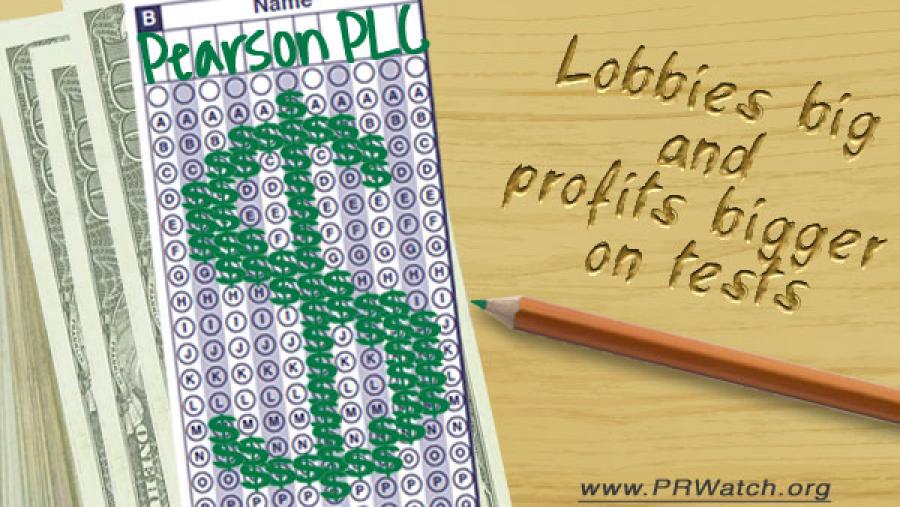Submitted by Jonas Persson on

PRESS RELEASE, March 30, 2015, Contact: Nikolina Lazic, 608-260-9713, [email protected]
(Madison, WI)–School testing corporations have spent at least $20 million on lobbying along with wining and dining or even hiring policymakers in pursuit of big revenues from federal and state testing mandates under "No Child Left Behind" measures and the Common Core curriculum, according to a new analysis by the Center for Media and Democracy (CMD).
The expanded testing has fueled a testing boom worth nearly $2 billion annually, giving the main corporations getting the testing contracts a huge return on investment for their lobbying while generating a growing backlash from parents across the country.
With huge reported lobbying expenditures in addition to other ways in which school officials have been wined, dined, and pursued (which has been subsidized by American taxpayers), these companies have left no stone unturned in their efforts to create, expand, and exploit No Child Left Behind and the growing U.S. school testing market,” noted Jonas Persson for CMD, a non-profit that tracks corporate influence on public policy and that launched the award-winning ALECexposed.org investigation.
Lisa Graves, CMD's Executive Director added: "The practices of these testing companies require much greater scrutiny by federal and state government officials as well as the press, in light of the troubling concerns that have been raised, including what one company called 'streamlined social media listening,' meaning unregulated spying on American school kids."
Privacy? With big stakes for the corporations, student privacy interests are taking a back seat to securing lucrative contracts, leaving aside concerns that the fixation on tests is distorting what's taught and displacing programs that prepare students to unleash their potential in an array of fields and interests whether they test well or not.
Just this month, a New Jersey blogger revealed that Pearson, whose parent company is headquartered in London and which holds a $108 million contract in the state, had been spying on kids’ Tweets and social media posts to clamp down on those suspected of sharing questions online.
Three of the four main testing companies have so far refused to sign the Student Policy Pledge against commercial data mining and, as documented by CMD, Pearson and ETS have a track record of lobbying against privacy protection for kids.
Quick Summary of Findings. CMD’s quick guide to the profits, lobbying, and troubling track records of the four big testing corporations includes revealing details about the four testing companies that dominate the U.S. market, such as:
- Pearson Education: Apart from $8 million spent lobbying from 2009 to 2014, Pearson also underwrote untold sums on luxury trips for school officials. A crackdown by the New York attorney general led to a $7.7 million settlement in 2013, and the shuttering of the “charitable” organization used for the scheme. The company is currently embroiled in a lawsuit in New Mexico for alleged bid rigging when landing an “unprecedented” $1 billion contract for K-12 testing with no other bidders, an allegation the company denied but which warrants greater scrutiny by policymakers.
- ETS (Educational Testing Service): The $1 billion-a-year non-profit pays its directors for-profit salaries. Outgoing president Kurt Landgraf received $1.3 million in total compensation in 2013. ETS has lobbied against legislation to require agencies to “immediately initiate an investigation” after complaints on “inadequate” testing conditions. It also lobbied against a bill designed to safeguard pupil data in subcontracting. ETS has also developed guidelines for tests which explicitly ban any mention of evolution and global warming.
- Houghton Mifflin: With revenues of $1.37 billion in fiscal year 2014, the company holds a 44% market share that includes some Common Core instructional resources and has its sights set on the pre-K testing and training market, crediting the federal government with creating “more opportunity in the early childhood market space from birth to eight” for revenue and profits. [Harcourt Mifflin told the Washington Post that "44 percent represents its 'addressable market share for U.S. instructional resources K-12,' which includes non-Common Core. The company also says it does not offer any high-stakes Common Core assessments."]
- McGraw-Hill: With rapid expansion of its testing business to make up for lost revenues from its textbook segment, McGraw-Hill’s state tests have been disrupted by “glitches” in multiple states, affecting tens of thousands of students taking the high-stakes exams. The company has so far refused to sign the Student Privacy Pledge.
Download a copy of CMD's full report below or read it online on CMD's SourceWatch.
Updated.
| Attachment | Size |
|---|---|
| 221.51 KB |
